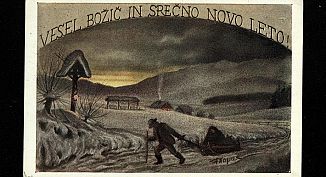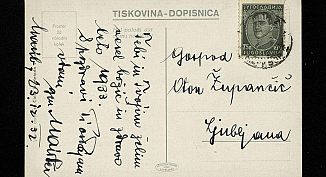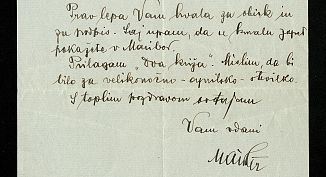Cultural worker
Maister knew the value of culture and had great respect for it. He was aware that, in addition to political and territorial sovereignty, language and culture must be the foundation of the Slovenian nation’s identity. Due to his unwavering military and moral authority, he became a respected public figure among both ordinary people and in intellectual circles. His letters can be found in the archives of noted Slovenian artists and scholars, including Fran S. Finžgar, Oton Župančič, Fran Albreht, Ivan Vrhovnik, Ivan Hribar and others. And manuscripts of his poems in the archives of the literary society Zadruga, among the material legacy of editor Janko Šlebinger and even among the singer Lili Novy’s materials. Correspondence with contemporaries testifies that Maister also understood his work in the field of culture as a personal and national calling and mission. As an art lover and president of the exhibition committee he was keynote speaker at the opening of the first art exhibition in Maribor on 8 December 1920. It was organised by the Grohar Art Club, which in 1931 changed its name to Brazda Art Club; today it is called the Maribor Fine Artists Society.
The General’s home at Maistrova 17 was a kind of artists’ salon. Every week he would invite Maribor artists – Ivo Šorli, Makso Šnuderl, Janko Glazer, Radivoj Reher, painters Viktor Cotič and Anton Gvajc – and theatricals, among them Danilo Gorišek, to visit. Prominent Slovenian writers would also visit him. One that visited him often was Oton Župančič. In 1933, on Maister’s initiative, the Writers Club was founded in Maribor. Maister’s collection of poems Kitica mojih was also published by the newly established Tiskovna zadruga, which published Slovenian books without profit and without copyright.



